| 19 April |
• yesterday • tomorrow |

• Apostolic Pilgrim
• Bruno of Egisheim
• Bruno of Eguisheim-Dagsburg
• Pilgrim Pope
Son of Count Hugh of Egisheim. Cousin of Emperor Conrad II. Chapter canon of Saint Stephen's, Toul, France. Deacon. Soldier and officer in the imperial army. In 1021, while still in the military, he was chosen bishop of Toul, France, a position he held for 20 years. Commanded troops under emperor Conrad II in the invasion of Italy in 1026. Very disciplined himself, he brought order to the monasteries in his diocese, discipline to the clergy, and the Cluniac reform to many of his houses. Mediator between France and the Holy Roman Empire. Chosen 151st pope with the support of the Roman citizens and Henry III of Germany.
Leo brought his reforming, disciplinary ways to the Church as a whole, reforming houses and parishes, fighting simony, enforcing clerical celibacy, encouraging liturgical development and the use of chant. He brought Hildebrand, later Pope Saint Gregory VII, to Rome as his spiritual advisor. Fought the coming Great Schism between the Eastern and Western churches. He received the nickname of Pilgrim Pope due to his travels through Europe, enforcing his reforms, insisting that his bishops, clergy, and councils follow suit. Held synods at Pavia, Italy, in Rheims, France, in Mainz, Germany, and in Vercelli, Italy where he condemned the heresy of Berengarius of Tours. Authorized the consecration of the first native bishop of Iceland. Peacemaker in Hungary. Proposed that Popes be elected only by cardinals.
Leo's papacy was marred by his military action. He added new Italian regions to the papal states, and when Normans invaded these areas in 1053, he personally led an army to throw them out. This resulted in wide-spread criticism, defeat in the field, his capture at Civitella, and several months imprisonment at Benevento, Italy. He spent his time there well, learning Greek to better understand the writings of the Eastern Church, but his health suffered badly, and he died soon after his release.
21 June 1002 at Eguisheim, Alsace, France as Bruno of Eguisheim-Dagsburg
12 February 1049
19 April 1054 in Saint Peter's Basilica, Rome, Italy of natural causes
• 1082 by Pope Saint Gregory VII
• 1887 by Pope Blessed Victor III
Sessa Aurunca, Italy
https://catholicsaints.info/pope-saint-leo-ix/
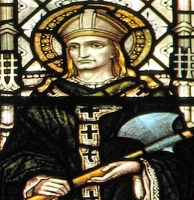
• Alphege the Martyr
• Alphege of Canterbury
• Alfege, Alphage, Alphege, Alphegus, Elphege, Godwine, Ælfheah, Aelfheah, Elfego, Elfege
8 June (translation of his relics)
Born to the nobility but gave it up to become a young monk at Deerhurst Abbey in Gloucestershire, England. Monk, anchorite, and then abbot at Bath Abbey; known for his personal piety and austerity. Bishop of Winchester, England in 984. Built several churches, installed a cathedral organ so large that it could be heard a mile away, and his charity was so great that there were reported to be no beggars in his diocese. May have helped negotiate a peace treaty in 994 which ended some Viking raids.
Archbishop of Canterbury, England in 1006. Encouraged devotion to Saint Dunstan of Canterbury. Translated the relics of Saint Swithun to Canterbury. In 1011 Danes began raiding again, laid seige to Canterbury, sacked the town, and captured Alphege along with several other Church officials, all of whom were held for ransom. Reported to have healed many of sick Danes by praying over them and feeding them blessed bread. Alphege refused to approve the payment of ransom for himself, and after several months was murdered by angry drunken Vikings, the first archbishop of Canterbury to die violently. Saint Thomas Becket was praying for Saint Alphege's intercession just before he was murdered.
• 954 in Weston, Somerset, England
• Anglo-Saxon
• beaten with stones and ox bones, then struck on the head with the blunt edge of an axe on 19 April 1012 in Greenwich, Kent (part of modern London), England
• interred in Saint Paul's Cathedral
• re-interred in Canterbury by King Canute in 1023
• his shrine was re-built and expanded in the early 12th century by Saint Anselm of Canterbury
• remains found incorrupt in 1105
• after a fire in the cathedral in 1174, Alphege's relics were re-interred by the high altar
1078 by Pope Saint Gregory VII
• Greenwich, England
• kidnap victims
• Solihull, England
• bishop holding an axe
• bishop with an axe in his head
• carrying stones in his chasuble
https://catholicsaints.info/saint-alphege-of-winchester/
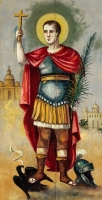
Elpidius, Expedite
Possibly legendary. Unclear whether his name led to his association with expeditious matters, or the other way around. This association led to his becoming the patron of people who had to deliver things on time.
• against procrastination
• for expeditious solutions
• merchants
• navigators
• prompt solutions
• young Roman soldier holding aloft a cross
• young Roman soldier holding aloft a banner with the word "hodie" (latin for 'today')
https://catholicsaints.info/saint-expeditus-of-melitene/
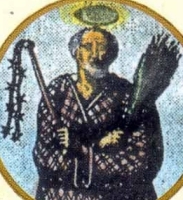
• Bernard of Maguellone
• Bernard the Penitent
To atone for the sins of his early life, including a murder, Bernard lived in complete poverty, wearing rags, eating whatever came to hand, if anything, travelling barefoot from one holy place to another, and living as a hermit between pilgrimages. In 1178 he settled near the abbey of Sithiu and spent his remaining four years in private penance and prayer.
19 April 1182 in the monastery of Saint-Bertin, Thérouanne region, France of natural causes
https://catholicsaints.info/blessed-bernard-of-sithiu/
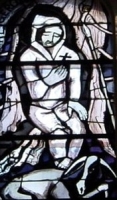
• Gerold of Großwalsertal
• Gerold of Grosswalsertal
• Gerold of Vorarlberg
• Adam of...
Born to the Saxon nobility. Donated land to the monastery of Einsiedeln, Switzerland where his sons, Cuno and Ulric became monks. Retired to live as a hermit near Mitternach, Germany.
Saxony (part of modern Germany)
16 April 978 of natural causes
https://catholicsaints.info/saint-gerold-of-saxony/
London bookseller. Convert to Catholicism. Married and father of one son. Arrested several times for printing and selling Catholic books before finally being executed for the crime. Martyr.
at Gilfortrigs, Skelsmergh, Westmorland, England
hanged on 19 April 1602 at Tyburn, London, England
15 December 1929 by Pope Pius XI
• book sellers
• publishers
https://catholicsaints.info/blessed-james-duckett/
Priest. Member of the Sons of the Holy Family. Treasurer. Teacher. Director of several centers run by the Sons. Writer and poet. One of the Martyrs of the Spanish Civil War.
24 May 1875 in Torelló, Barcelona, Spain
• 19 April 1937 in Montcada, Barcelona, Spain
• his remains were never found
13 October 2013 by Pope Francis
https://catholicsaints.info/blessed-ramon-llach-candell/
Priest. Member of the Sons of the Holy Family. One of the Martyrs of the Spanish Civil War.
1 October 1878 in Torelló, Barcelona, Spain
• 19 April 1937 in Montcada, Barcelona, Spain
• remains were never located
13 October 2013 by Pope Francis
https://catholicsaints.info/blessed-jaume-llach-candell/
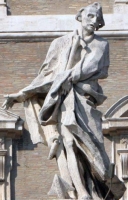
Fourth-century priest. Martyred with five unnamed Christians in the persecutions of Diocletian.
drowned in Alexandria, Egypt
https://catholicsaints.info/saint-apollonius-the-priest/
Monk. Bishop of Antioch, Pisidia. Attended the Second Council of Nicea in 787. Opposed the iconoclasts, for which he was exiled by Emperor Leo V, the Armenian.
815 of natural causes
https://catholicsaints.info/saint-george-of-antioch/
Daughter of Saint Pusicio. Nun. Martyred in the persecutions of Shapur II.
Easter, 341 in Persia
https://catholicsaints.info/saint-martha-of-persia-19-april/
Sub-deacon in Florence, Italy. Spiritual student of Saint Zenobius and Saint Ambrose.
c.396
https://catholicsaints.info/saint-crescentius-of-florence/
Martyred in the persecutions of Diocletian.
c.304 in Collioure, Languedoc (in modern France)
https://catholicsaints.info/saint-vincent-of-collioure/
Martyr.
4th century Armenian
at Melitene, Armenian
https://catholicsaints.info/saint-aristonicus-of-melitene/
Martyr.
4th century Armenian
at Melitene, Armenian
https://catholicsaints.info/saint-galata-of-melitene/
Martyr.
4th century Armenian
at Melitene, Armenian
https://catholicsaints.info/saint-gaius-of-melitene/
Martyr.
4th century Armenian
at Melitene, Armenian
https://catholicsaints.info/saint-rufus-of-melitene/
A group of Christians martyred in the persecutions of Decius. We know little more than the names - Aristo, Basso, Credula, Donato, Ereda, Eremio, Fermo, Fortunata, Fortunio, Frutto, Julia, Mappalicus, Martial, Paul, Venusto, Victorinus and Victor.
250 in prison in Carthage, North Africa (modern Tunis, Tunisia)
https://catholicsaints.info/martyrs-of-carthage-19-april/
• Conrad of Ascoli
• Emma of Saxony
• Killian
• Loubouer
• Paphnutius of Jerusalem
• Timon the Deacon
CatholicSaints.Info Portable Edition